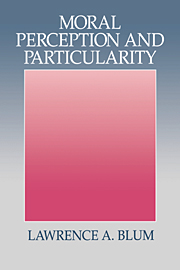Book contents
- Frontmatter
- Contents
- Acknowledgments
- PART I PARTICULARITY
- PART II MORAL EXCELLENCE
- 4 Moral exemplars: reflections on Schindler, the Trocmés, and others
- 5 Vocation, friendship, and community: limitations of the personal-impersonal framework
- 6 Altruism and the moral value of rescue: resisting persecution, racism, and genocide
- 7 Virtue and community
- PART III THE MORALITY OF CARE
- Index
5 - Vocation, friendship, and community: limitations of the personal-impersonal framework
Published online by Cambridge University Press: 12 January 2010
- Frontmatter
- Contents
- Acknowledgments
- PART I PARTICULARITY
- PART II MORAL EXCELLENCE
- 4 Moral exemplars: reflections on Schindler, the Trocmés, and others
- 5 Vocation, friendship, and community: limitations of the personal-impersonal framework
- 6 Altruism and the moral value of rescue: resisting persecution, racism, and genocide
- 7 Virtue and community
- PART III THE MORALITY OF CARE
- Index
Summary
The conflict between personal projects and the impersonal demands of morality has been an important focus of recent moral theory. The writings of Thomas Nagel (1986), Susan Wolf (1982), Norman Care (1984, 1987), and others concern themselves with whether, and the extent to which, morality understood as impersonal, impartial, universal, and rational does, or ought to, constrain personal projects and satisfaction. These writers appropriately question the unexamined presumption of traditional moral theories, especially of a Kantian or utilitarian stripe, that the impersonal demands of morality ought always and automatically to take precedence over personal pursuits. However, they also make the further assumption that ethical reflection must take place within a framework defined solely by the personal-impersonal dichotomy.
A second currently prominent issue is the communitarian critique of liberalism. An important strand of this critique is that because of its (alleged) bias toward individualism, liberalism cannot account for, nor can a liberal polity sufficiently foster, communalist social and political values such as a sense of community, citizen participation, the integrity of distinct cultures, specific shared goods as constitutive of political community, and the like.
The communitarianism-liberalism dispute has operated primarily in two philosophic domains – political philosophy and the “metaphysical” theory of the self. Regarding the latter, for example, Michael Sandel (1982) argues against John Rawls (1971) that the identities of selves are in part constituted by their communal attachments (to nation, ethnic group, family, class, and other such communal entities) and that this feature of the self is denied by Rawls's liberalism.
- Type
- Chapter
- Information
- Moral Perception and Particularity , pp. 98 - 123Publisher: Cambridge University PressPrint publication year: 1994
- 1
- Cited by



